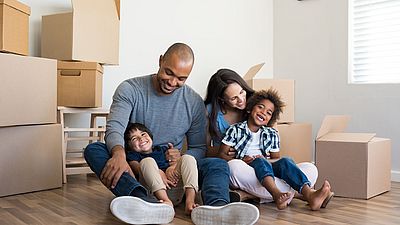There is a large supply of high-quality rental accommodation in Germany, but demand is also high, especially in the major cities. We give you tips and explain what you should consider before and after moving in.
Your first accommodation
Until you find a place to live in Germany, you can stay in a furnished holiday flat, hostel, hotel or youth hostel. However, it will not normally be possible to register this address as your place of residence. Please note that you are required to register your place of residence with the relevant authorities within two weeks of your arrival in Germany. (See the “Moving in” section.)
What types of accommodation are available?
There are many ways to feel at home in Germany. The following options are available to you:
Rental flats
- Long-term accommodation (three months’ notice)
- Not usually furnished; not always equipped with a kitchen
Short lets
- Temporary accommodation for a fixed period
- Usually furnished
Flatshare
- Individual and usually flexible rental periods and furnishing arrangements
- Shared accommodation with flatmates, usually cheaper than living alone
- Usually a shared kitchen and bathroom; each resident has their own private room
Student residences (for students only)
- Usually furnished, relatively inexpensive
- A range of different options: individual apartments, single rooms with a shared kitchen and bathrooms, parent-child apartments
- Residents are usually all students, good social opportunities, sometimes leisure activities
- There are often waiting lists; it is advisable to apply early to the student union responsible for your university. The German Academic Exchange Service (DAAD) also offers a wide range of advice on finding accommodation.
Shared flats (called Wohngemeinschaften or WGs in German) are often a cheaper option than having a place of your own, especially in major cities. As it may take longer than expected to find the right accommodation, a holiday apartment or furnished short let may be a good option for your first few months in Germany. This will also give you time to prepare the documents you will need to find longer-term accommodation, such as payslips or proof of having opened a bank account.
In housing ads, you will often see phrases such as “2-room flat” (2-Zimmer-Wohnung). This usually means that the flat has two rooms (e.g. a bedroom and a living room) as well as a kitchen area and a separate bathroom with a toilet. An explanation of common abbreviations can be found in this PDF file.




